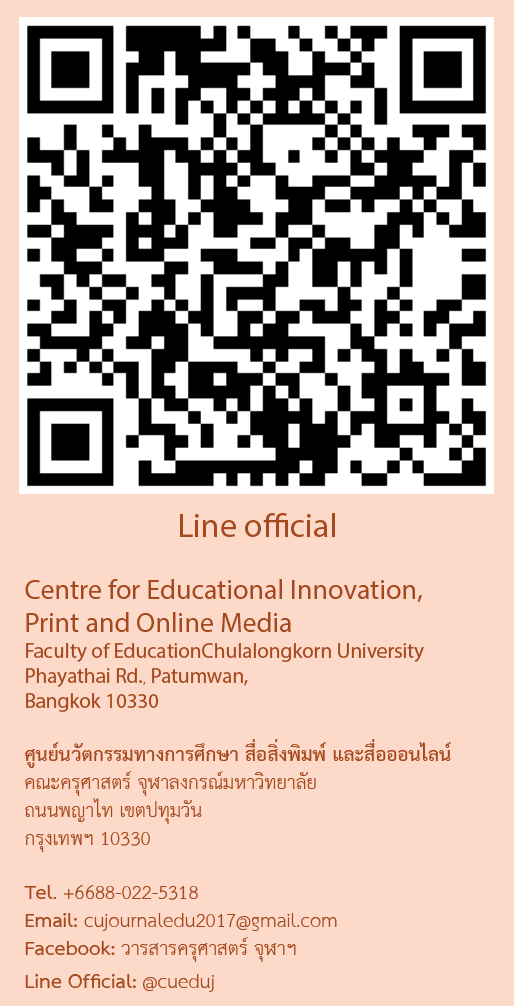Article Title
An Analysis and Synthesis of Philosophies, Concepts, and Principles of Lifelong Education for Becoming a Learning Community
Abstract
The objectives of this research are to analyze and synthesize the philosophy, the concept, and the principle of lifelong education for learning community, and also, to present the knowledge of the philosophy, the concept, and the principle of lifelong education for learning community. This research was conducted by document analysis and group discussion of lifelong education experts to evaluate information. The findings are: The philosophy of lifelong education for learning community consists of four aspects: 1. The belief in people and community that they have potential. 2. Learning is the change of the better people and community. 3. People and community can learn well when they get what they need. 4. Learning community can solve the difficulties which occur in the community. The concept of lifelong education for learning community consists of four ideas:1. People and community are able to learn based on their need and interest 2. People can learn by themselves by using their own means and style 3. Learning can happen in anywhere and anytime and there are no boundaries of learning 4. Learning should respond to people?s need and interest and it should not be against the culture of community and society. The principle of lifelong education for learning community is composed of six principles: 1. principles of learning, 2. principles of benefit-based, 3. principles of thinking and action, 4. principles of leadership, 5. principles of communication, and 6. principles of inside community strength(งานวิจัยนี้เป็นการศึกษาเชิงคุณภาพที่มีวัตถุประสงค์เพื่อวิเคราะห์ สังเคราะห์ และนำเสนอปรัชญา แนวคิดและหลักการของการศึกษาตลอดชีวิตเพื่อการเป็นชุมชนแห่งการเรียนรู้ ดำเนินการวิจัยด้วยการวิเคราะห์เอกสาร และการประชุมสนทนากลุ่มผู้ทรงคุณวุฒิทางการศึกษาตลอดชีวิตเพื่อประเมินผลข้อมูล ผลการวิจัยพบว่า ปรัชญาของการศึกษาตลอดชีวิตเพื่อเป็นชุมชนแห่งการเรียนรู้มี 4 ข้อ ประกอบด้วย 1. ความเชื่อว่าชุมชนและบุคคลมีศักยภาพ 2. หัวใจของการเปลี่ยนแปลงคือการเรียนรู้3. การเรียนรู้ที่มีคุณค่าคือ การเรียนรู้ตามความต้องการ 4. การเรียนรู้ของชุมชนเกิดขึ้นด้วยกลไกการขับเคลื่อนของชุมชนเพื่อพัฒนาชุมชน แนวคิดของการศึกษาตลอดชีวิตเพื่อการเป็นชุมชนแห่งการเรียนรู้มี4 แนวคิดประกอบด้วย 1. บุคคลมีความเท่าเทียมในการเรียนรู้ด้วยตนเองและเรียนรู้อย่างมีส่วนร่วมกับชุมชน 2. บุคคลสามารถเรียนรู้ได้ด้วยตนเองโดยใช้วิธีและรูปแบบการเรียนรู้ของตนเอง 3. การเรียนรู้และกิจกรรมการเรียนรู้สามารถเกิดขึ้นได้ในทุกพื้นที่ของชุมชน 4. การเรียนรู้ต้องสามารถตอบสนองความต้องการของบุคคลโดยไม่ขัดแย้งกับวัฒนธรรมของชุมชนและสังคม หลักการของการศึกษาตลอดชีวิตเพื่อการเป็นชุมชนแห่งการเรียนรู้มี 6 หลักการ ประกอบด้วย 1. หลักการเรียนรู้ ได้แก่ มีการศึกษาข้อมูลอย่างเป็นระบบ เรียนรู้อย่างมีส่วนร่วม และเรียนรู้อย่างเรียบง่าย สอดคล้องกับธรรมชาติในชุมชน2. หลักการด้านประโยชน์ตอบแทน ได้แก่ ชุมชนต้องได้รับประโยชน์จาก การแลกเปลี่ยนของบุคคลซึ่งเห็นประโยชน์ของส่วนรวมเป็นหลัก 3. หลักการคิดและลงมือทำ ได้แก่ ชุมชนเรียนรู้การแก้ปัญหาด้วยการมองเห็นภาพปัญหาควบคู่ไปกับการคิดอย่างเป็นองค์รวม มีการลงมือปฏิบัติจริงที่ส่งเสริมการเรียนรู้อย่างเป็นลำดับขั้นตอน 4. หลักการความเป็นผู้นำ ได้แก่ มีผู้ปฏิบัติที่เป็นต้นแบบของการเรียนรู้ 5. หลักการสื่อสารได้แก่ การทำความเข้าใจเพื่อนำไปสู่การเรียนรู้ร่วมกัน และ 6. หลักการระเบิดจากภายใน ได้แก่ การสร้างภูมิต้านทานที่เข้มแข็งภายในชุมชนก่อนที่จะนำความเจริญจากภายนอกเข้ามา)


